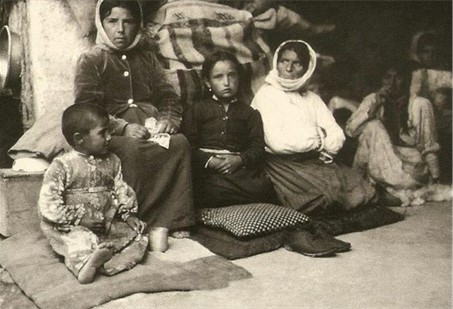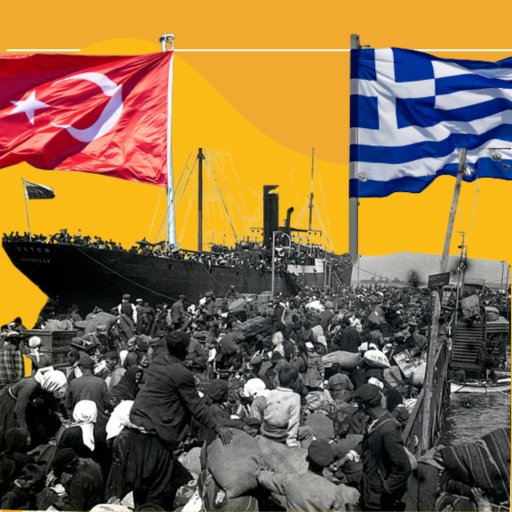The Voice of The Victims of The Greco-Turkish Population Exchange
5 Eylül 2022Şafak Gün
There is a book which is titled “This book consists of lots of interviews which were done with mübadil people. I am planning to examine some of these interviews and write a critical analysis about them by giving reference to the concept of “victimization.” In this analysis, I argue that mübadil people are the victims of the population exchange which occurred in 1923 between Turkey and Greece. I will demonstrate how suffered from the exchange period and how they became the victims of the exchange by giving references to the interviews in the book. Indeed, the elderly woman in the fourth video of the documentary titled “Mübadelenin İki Köyü” explains my main argument clearly by stating that “Ne suçumuz var bizim büyük kafalar birbirlerini yiyorsalar? (What is our fault if people at the head of the countries are in conflict?)” (lozan.mübadilleri vakfı, 2013, 5:00).
The interviews that I am going to use to analyze will be related to the narrative of victimization. Exertzoglou (2016) defines the narrative of victimization as the narrative that starts with a happy and prosperous story and ends with a dramatic and traumatic closing in the article titled “Children of Memory: Narratives of the Asia Minor Catastrophe and the Making of Refugee Identity in Interwar Greece” (p. 351). While I was reading Özsoy’s book, I realized that most of the narratives of victimization converge on the same topics. These topics can be categorized as the deportation process, changing economic conditions, language issues, identity issues, and violence.
Firstly, even though there were people who said that they wanted the exchange because of the aggressions of some offensive nationalist groups on some minority villages both in Turkey and Greece and there were people who stated that they did not want the exchange because they loved their homeland and their neighbors, they converged on the same idea that they had lots of difficulties during their deportation process both while they were waiting for the ship that will carry away them to their new homelands and while they were in the ship. Köker (2003) points out that only the ones who paid the fare could travel in the ship’s cabin, whereas other exchangees could travel in the lower deck[ambar] by giving reference to the interviewer Sakine Günaydın (p. 198). We can see a similar experience in Özsoy’s book too.

For example, Fatma Gültekin, one of the exchangees in the book, states that they were in danger of sinking and had to sleep on the lower deck[ambar] for 11 days with only a pillow and a blanket (p. 59). In addition, there were even exchangees who died on the ship or after a short time being settled since there were infectious diseases, and the death toll reached 3819 in total (Köker, 2003, p. 198). For instance, Zeynep Pirkin, one of the exchangees in Özsoy’s book, says that her mother got ill on the ship, and people brought her to a hospital in Tekirdağ, but she has never seen her mother again (p. 173).
Secondly, when they arrived at their new houses, they faced financial difficulties because they left nearly all their properties in their old houses, and the two governments did not help these people much to solve this problem. Köker (2003) points out that property-ownership documents and title deeds had to be provided for the households to receive the equivalent of those possessions in Turkey as written in the Lausanne Convention for the mübadil people coming from Greece, whereas the Turkish government did not apply this according to most of the informant exchangees (p. 199). For example, Müyesser Ertunç, who is one of the mübadil people, says that “The government said that we will be given new properties that are equivalent to our old properties, but the properties given to us were not even equivalent to half of our old properties.” in Özsoy’s book (p. 39). Also, especially the exchangees coming from Greece to Turkey had difficulty a lot since they were coming from rural places, they were small-scale farmers, and they were not settled in areas with familiar crops and climatic regimes (Hirschon, 2003, p. 16). For instance, Hüseyin Yağcı, who is one of the mübadil people coming from Crete, says that most of the Cretans did not earn a living in Trilye since the soil could not feed them, so they moved to other parts of the country (Özsoy, 2003, p. 70).

Finally, when their identities and languages were turned into a danger to their life because some offensive nationalists did not want the exchangees in their neighborhood, these mübadil people were exposed to violence. For example, Saim Turan, one of the mübadil people coming to Mudanya from Crete, states that when they came to Mudanya, his father was happy to become a mübadil family since some local Greek people had started to behave badly toward Turkish people in Greece. However, some of the locals in Mudanya beat young exchangees every week and slung the houses of the exchangees. His father said, “I wish we hadn’t come here,” and he was really happy when they first came to Mudanya (p. 72).
References
- Clarck, B. (2006). Adapting to Anatolia. In Twice a stranger (pp. 180-200). Harvard University Press.
- Exertzoglou, H. (2016). Children of memory: Narratives of the Asia minor catastrophe and the making of refugee identity in interwar Greece. Journal of Modern Greek Studies, 34(8), 343-366.
- Hirschon, R. (2003). Consequences of the Lausanne Convention: An overview. In R. Hirschon (Ed.), Crossing the Aegean (pp. 13-20). Berghahn Books.
- Köker, T. & Keskiner, L. (2003). Lessons in refugeehood: The experience of forced migrants in Turkey. In R. Hirschon (Ed.), Crossing the Aegean (pp. 193-208). Berghahn Books.
- Lozan.mübadilleri vakfı. (2013, July 4). Mübadelenin iki köyü [The two villages of exchange] [Video]. YouTube. https://youtu.be/vvPdnYQOSqA
- Özsoy, İ. (2003). İki vatan yorgunları: Mübadelenin acısını yaşayanlar anlatıyor [Tireds of two homelands: Those who experience the pain of the exchange tell]. Bağlam Yayınları.

